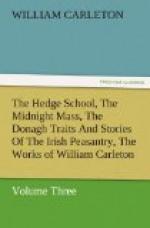THE HEDGE SCHOOL.
There never was a more unfounded calumny, than that which would impute to the Irish peasantry an indifference to education. I may, on the contrary, fearlessly assert that the lower orders of no country ever manifested such a positive inclination for literary acquirements, and that, too, under circumstances strongly calculated to produce carelessness and apathy on this particular subject. Nay, I do maintain, that he who is intimately acquainted with the character of our countrymen, must acknowledge that their zeal for book learning, not only is strong and ardent, when opportunities of scholastic education occur, but that it increases in proportion as these opportunities are rare and unattainable. The very name and nature of Hedge Schools are proof of this; for what stronger point could be made out, in illustration of my position, than the fact, that, despite of obstacles, the very idea of which would crush ordinary enterprise—when not even a shed could be obtained in which to assemble the children of an Irish village, the worthy pedagogue selected the first green spot on the sunny side of a quickset-thorn hedge, which he conceived adapted for his purpose, and there, under the scorching rays of a summer sun, and in defiance of spies and statutes, carried on the work of instruction. From this circumstance the name of Hedge School originated; and, however it may be associated with the ludicrous, I maintain, that it is highly creditable to the character of the people, and an encouragement to those who wish to see them receive pure and correct educational knowledge. A Hedge School, however, in its original sense, was but a temporary establishment, being only adopted until such a school-house could be erected, as it was in those days deemed sufficient to hold such a number of children, as were expected, at all hazards, to attend it.
The opinion, I know, which has been long entertained of Hedge Schoolmasters, was, and still is, unfavorable; but the character of these worthy and eccentric persons has been misunderstood, for the stigma attached to their want of knowledge should have rather been applied to their want of morals, because, on this latter point, were they principally indefensible. The fact is, that Hedge Schoolmasters were a class of men from whom morality was not expected by the peasantry; for, strange to say, one of their strongest recommendations to the good opinion of the People, as far as their literary talents and qualifications were concerned, was an inordinate love of whiskey, and if to this could be added a slight touch of derangement, the character was complete.
On once asking an Irish peasant, why he sent his children to a schoolmaster who was notoriously addicted to spirituous liquors, rather than to a man of sober habits who taught in the same neighborhood,




